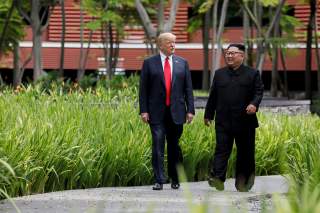The Hanoi Summit – We Asked Henri Feron What Happens Next in U.S.-North Korea Relations
"Hanoi would have been a terrific opportunity for both sides to call it quits and mitigate their losses. Trump nevertheless walked in an attempt to sweeten the deal – and perhaps also to remind everybody of how dangerous a no-deal would be."
Editor’s Note: Looking for more opinions on where we go after the Hanoi summit? Check out all 80 expert takes on where U.S-North Korea relations go next here.
The Hanoi Summit confirmed once more that sanctions will not force North Korea to surrender and disarm. Kim Jong-un offered to stop developing his arsenal, but he did not put any existing weapons up for negotiation. There are fewer and fewer excuses for believing that sanctions would ever force him to. Kim did admit that sanctions were a nuisance by asking for them to be dialed back to what they were before North Korea’s fourth nuclear test in 2016. Yet the country’s situation right now is not even remotely as bad as during the 1950s and 1990s. North Korea held together when it was bombed back to the stone age during the Korean War and again when it suffered a million-death famine after the Soviet collapse. If there is no deal this time, there should be little doubt that Kim will resume the development of better bombs and missiles until the next administration comes around.
President Donald Trump’s “maximum pressure and engagement” policy was aptly designed to take the best possible shot at ending the crisis once and for all. It maximized U.S. bargaining power before sitting down for a deal. Hanoi just made clear that this did not quite suffice to get rid of the nuclear weapons. After the summit, Trump commented twice on the difficulty to make up for past U.S. mistakes. The nuclear crisis, he said, “was something that should’ve been handled by other Presidents long before me and long before [the North Koreans] had the kind of power that they have.” Indeed, every time a President tried to kick the can down the road, the threat to U.S. national security only grew worse.
Hanoi would have been a terrific opportunity for both sides to call it quits and mitigate their losses. Trump nevertheless walked in an attempt to sweeten the deal—and perhaps also to remind everybody of how dangerous a no-deal would be. That was a legitimate move to maximize U.S. gains. Yet North Korean foreign minister Ri Yong-ho countered it by going on record saying the Hanoi proposal was a final offer. This makes it difficult for either side to compromise and threatens to throw us back to the “fire and fury” impasse of 2017. Accordingly, much depends now on the ability of South Korean President Moon Jae-in to mediate between the parties at a trilateral summit. The presence of South Korea would then truly allow the deal to be crowned with a declaration that the Korean War has ended.
Henri Féron is a Postdoctoral Research Associate at the Center for Korean Legal Studies, Columbia Law School. Follow him on Twitter @henriferon.
Image: Reuters

